Commercial HVAC Rothley
Find the best Business HVAC in Rothley
Get up to 3 Commercial HVAC Systems quotes for your project today! Compare profiles, reviews, accreditations, portfolio, etc... and choose the best offer.
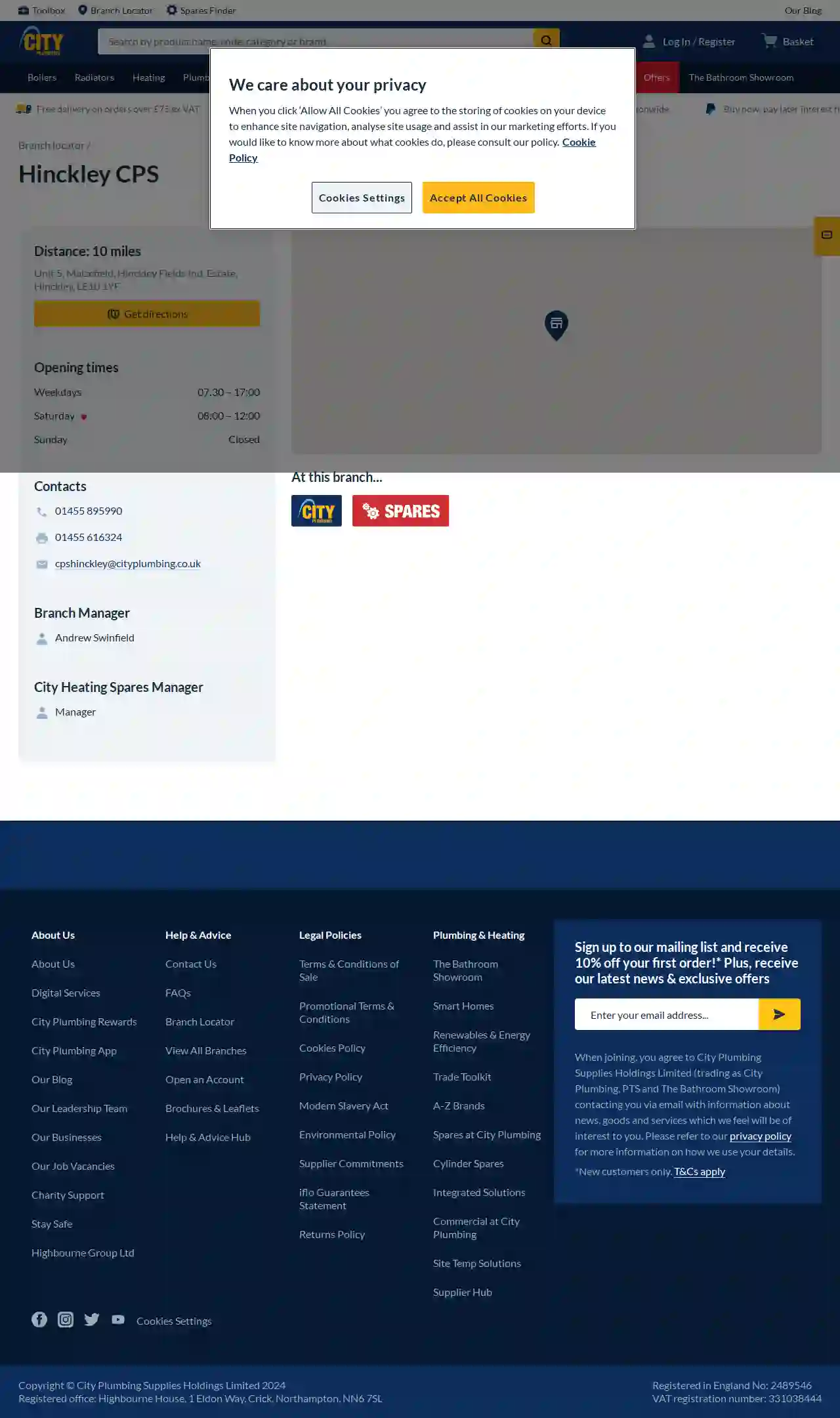
City Plumbing
32 reviewsunit 5, maizefield, hinckley fields ind. estate, hinckley, Hinckley, LE10 1YF, GBCity Plumbing are your trusted plumbing and heating suppliers for the trade. Whether you’re fitting a new boiler, radiator or full bathroom suite, we’ve got all the tools you need to get the job done. From electricals to plumbers’ supplies and much, much more – we stock all the top brands at affordable trade prices. When you’re on a job, time is money. That’s why we stock a wide range of essential products. From copper tubing to towel rails, we’ll make sure you get the plumbing supplies you need within a day or so. As award-winning plumbers’ merchants and specialist distributors, we’ve got over 350 branches across the UK and have been serving our loyal customers for over 40 years. As such, we offer next-day delivery and click & collect options to suit you – because nobody likes to be kept waiting. For the best quality plumbing supplies from reputable manufacturers, find your local branch or get in touch with our team. If you’d like a little more inspiration, come on down to our bathroom showrooms. Our specialist team is always on hand to offer professional advice to assist you with your next project.
- Services
- Why Us?
- Accreditations
- Gallery
Get Quote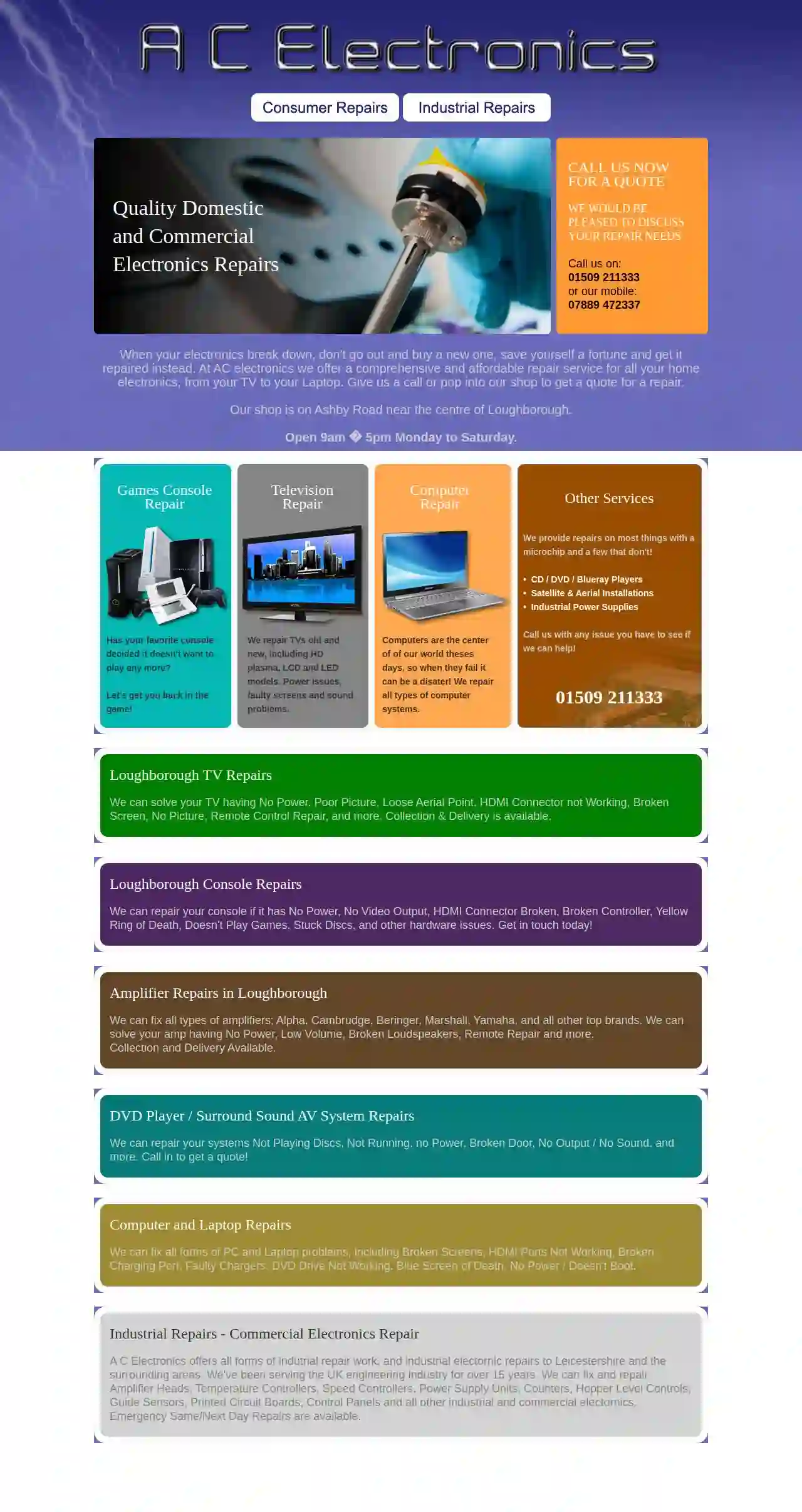
ac electronics
4.7160 reviewsAshby Road, Loughborough, GBAt AC Electronics, we offer a comprehensive and affordable repair service for all your home electronics, from your TV to your Laptop. We've been serving the UK engineering industry for over 15 years. We can fix and repair Amplifier Heads, Temperature Controllers, Speed Controllers, Power Supply Units, Counters, Hopper Level Controls, Guide Sensors, Printed Circuit Boards, Control Panels and all other industrial and commercial electronics. Our shop is located on Ashby Road near the centre of Loughborough and we are open 9am - 5pm Monday to Saturday.
- Services
- Why Us?
- Gallery
Get Quote
Shepshed Plumbing & Heating Ltd
Shepshed Industrial Estate, Shepshed, Unit 1, LE12 9AA, GBShepshed Plumbing & Heating Ltd is a company established in 2007 with over 20 years of experience in plumbing and heating. They offer a wide range of services, including air and ground source heat pumps, plumbing, commercial and domestic gas, LPG, water regulations, unvented systems, solar systems, domestic and commercial ventilation. The company prides itself on its qualifications, holding OFTEC & GAS SAFE registration, NVQ levels 1, 2 & 3 in Mechanical Engineering, and various certifications such as Boiler Breakdowns, Legionnaires, Part L, Gas Meters (met1), Asbestos Awareness, First Aid, and CSCS cards. They emphasize their commitment to customer satisfaction, meeting deadlines, and clear communication.
- Services
- Why Us?
- Accreditations
- Gallery
Get Quote
Transcool Ltd
32 reviews166 Battram Road, Coalville, LE67 1GB, GBTranscool is a refrigeration company based in the East Midlands, specialising in refrigeration applications. Our competent trained Refrigeration Engineers carry out efficient economic refrigeration repairs and service. We understand a small food takeaway has different requirements to corporate manufacturers, so we tailor our service to meet your needs. We are always keen to save our customers money in all aspects, be it energy saving or economical solutions. We are dedicated to meeting your temperature control and refrigeration needs whilst delivering exceptional service and customer care.
- Services
- Why Us?
- Testimonials
- Gallery
Get Quote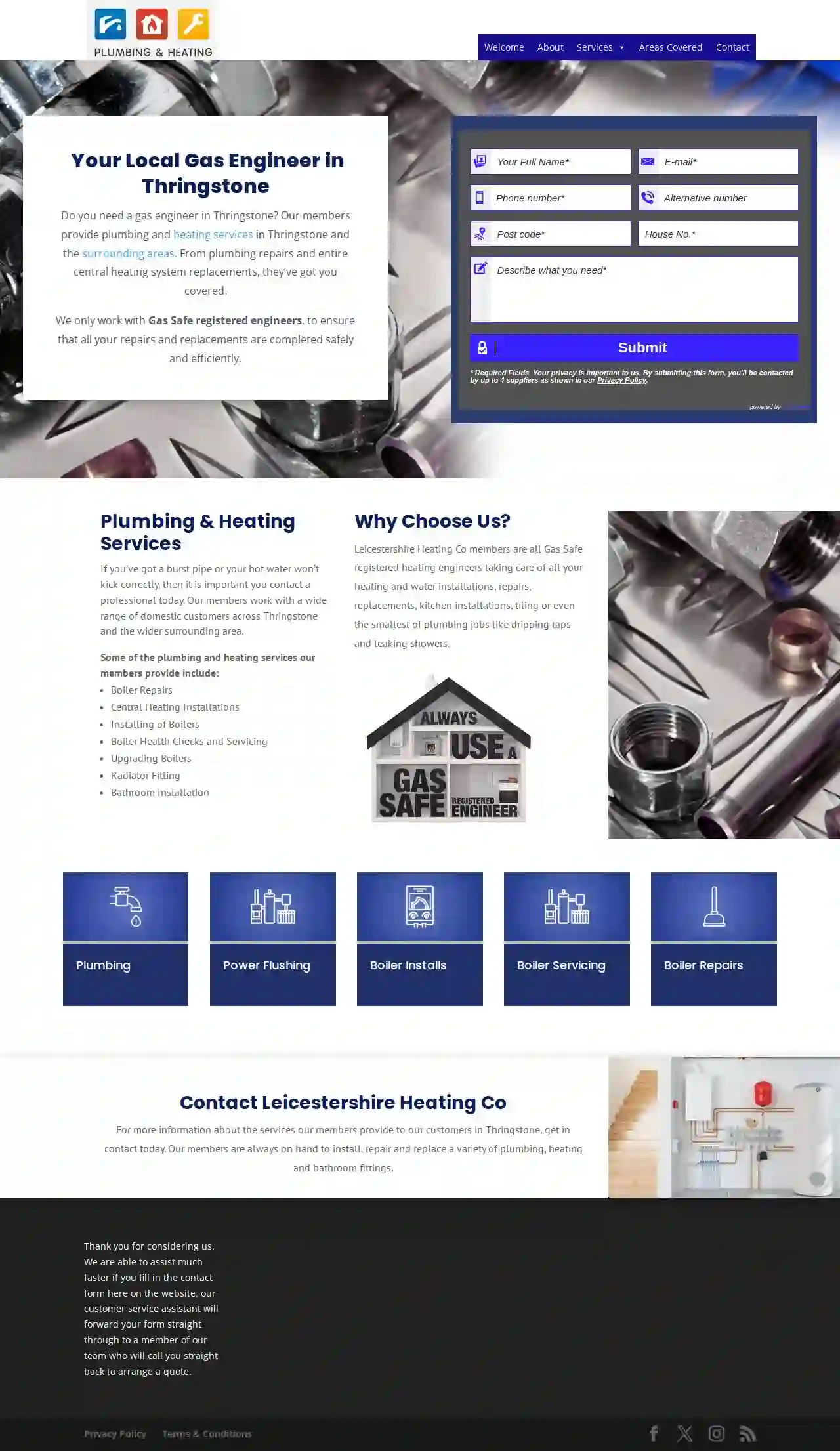
Anderson Gas Heating Services
Coalville, GBLeicestershire Heating Co provides plumbing and heating services in Leicestershire and the surrounding areas. Our members are Gas Safe registered engineers, ensuring all repairs and replacements are completed safely and efficiently. We offer a range of services, including boiler repairs, central heating installations, boiler health checks and servicing, upgrading boilers, radiator fitting, and bathroom installation. Our team is dedicated to providing excellent customer service and ensuring that all our customers receive the highest level of workmanship and professionalism.
- Services
- Why Us?
- Gallery
Get Quote
GalxC Cooling Midlands
Coalville, GB- Services
- Why Us?
- Gallery
Get Quote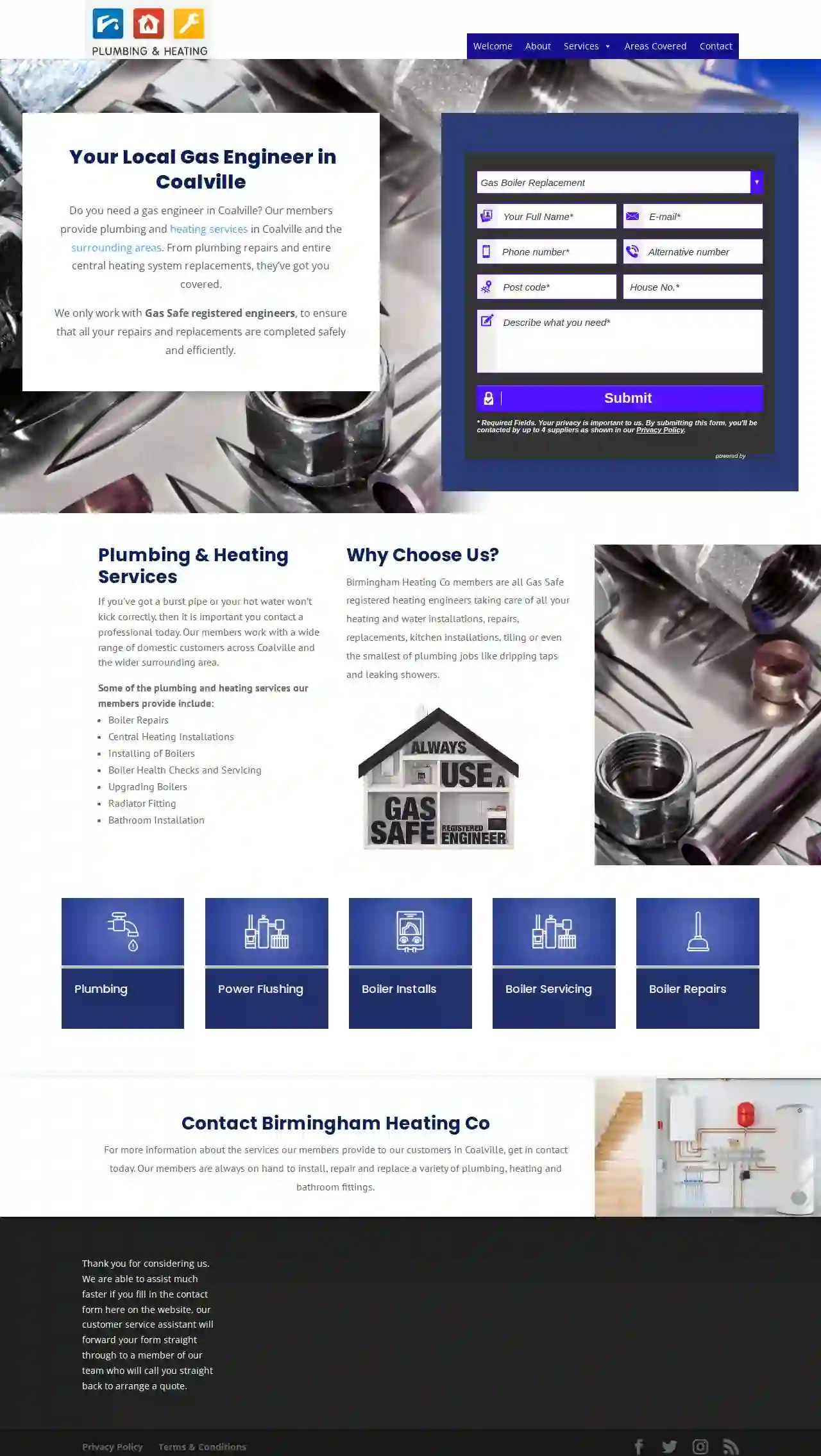
G mcCarthy & son
32 reviewsBirmingham, 123 Main St, B1 1AA, GBBirmingham Heating Co provides plumbing and heating services in Birmingham and the surrounding areas. Our members are Gas Safe registered engineers, ensuring all repairs and replacements are completed safely and efficiently. We offer a range of services, including boiler repairs, central heating installations, boiler health checks and servicing, upgrading boilers, radiator fitting, and bathroom installation. Our team is dedicated to providing excellent customer service and ensuring that all our customers receive the highest level of workmanship and professionalism.
- Services
- Why Us?
- Gallery
Get Quote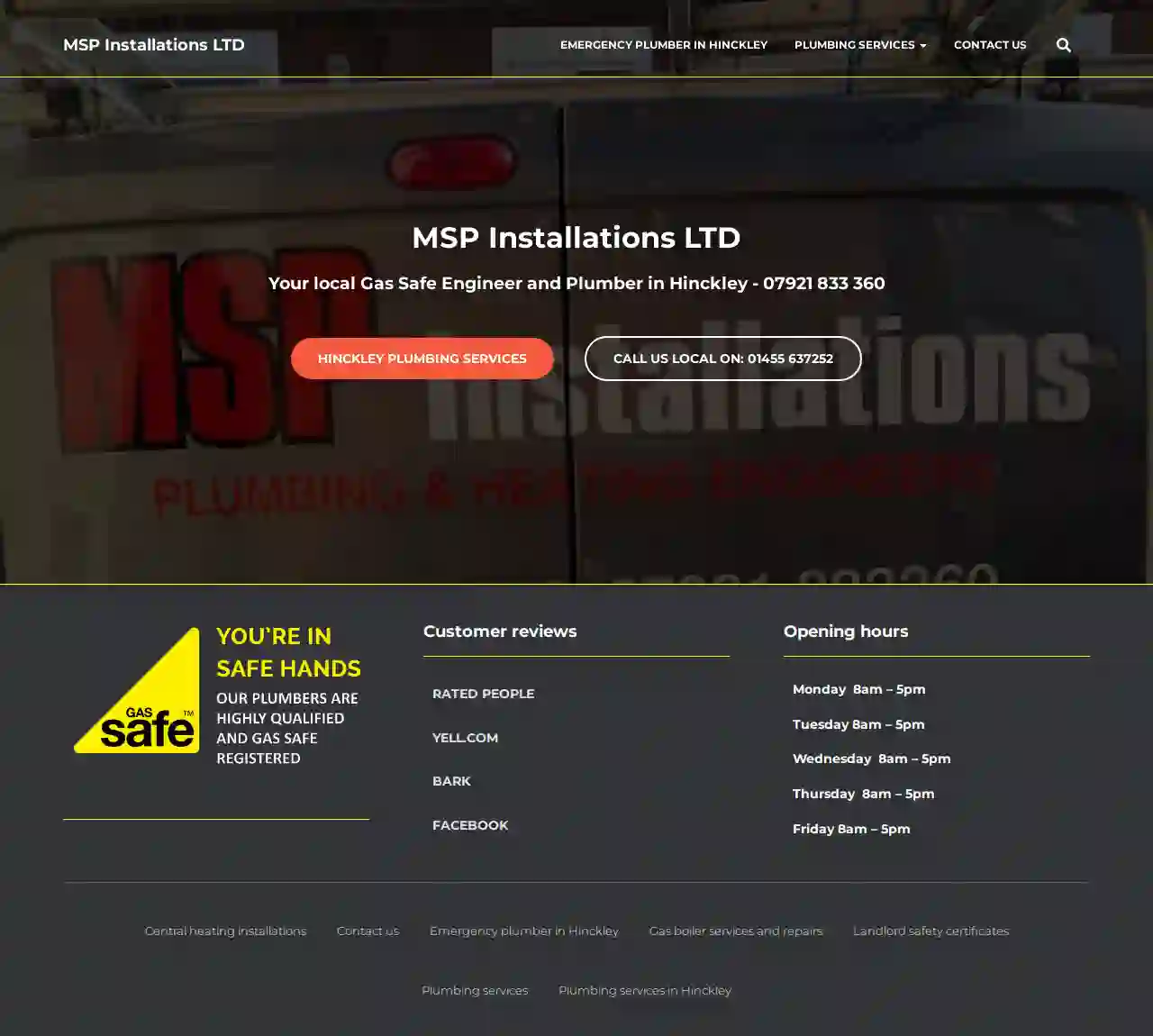
M S P Installations
511 reviewsHinckley, Unit 1, 14-16 Coventry Road, LE10 1XN, GBMSP Installations LTD is a local business providing emergency plumber services in Hinckley. We offer a range of plumbing services, including gas boiler services and repairs, landlord safety certificates, and central heating installations. Our team of experienced plumbers is dedicated to providing top-notch services to our customers. With a strong reputation in the community, we are proud to be your local Gas Safe Engineer and Plumber in Hinckley. Contact us today to schedule an appointment or learn more about our services.
- Services
- Why Us?
- Gallery
Get Quote
MSP Installations
4.512 reviewsHinckley, LE10, GBMSP Installations LTD is your local Gas Safe Engineer and Plumber in Hinckley. We offer a wide range of plumbing and gas services, including emergency plumbing, boiler services and repairs, landlord safety certificates, and central heating installations. Our team of experienced engineers is dedicated to providing high-quality workmanship and excellent customer service. We are committed to providing reliable and efficient solutions for all your plumbing and heating needs. Whether you require a simple repair or a complete system installation, we have the expertise and resources to deliver exceptional results. Contact us today for a free quote.
- Services
- Why Us?
- Gallery
Get Quote
REMS Solutions Ltd
4.25 reviewsEast Leake, Unit 2 Station Road, LE12 6LQ, GBREMS Solutions is a trusted provider of Electrical, Mechanical, Refrigeration and Construction services throughout the UK. Our unrivalled customer service and pro-active communication means that we are the partner of choice for a number of leading retail brands in the UK. Partnering with us for your compliance, proactive and reactive maintenance gives you reliable support for all your facilities. REMS can work with you to provide a bespoke solution, tailored to your business needs, no matter the size. Looking for an expert team to renovate, install electrical, maintain a property inclusive of building works or to install Air Conditioning and heating facilities? REMS can assist with most facilities management projects – Why would you choose anyone else? With 20 years in facilities management and 40 years in electrical engineering, REMS has the expertise to deliver a wide range of services including air conditioning design and installation, electrical maintenance and breakdown cover, and more. Our team of experienced engineers have worked in retail, leisure, commercial and industrial sectors and specialise in providing bespoke low energy air conditioning installations including HVAC and VRV. We provide a ‘one call solution’ delivered by REMS or our partners, with a range of services including mechanical, electrical, air conditioning, refrigeration, building fabric, handyman planned visits, portable appliance testing, statutory inspections, thermal image reports, CAPEX works, 24/7 helpdesk, asset tagging & SFG20 alignment, planned & reactive breakdowns, managing 3rd party suppliers, and more.
- Services
- Why Us?
- Testimonials
- Gallery
Get Quote
Over 12,692+ HVAC Companies onboarded
Our HVAC contractors operate in Rothley and beyond!
HVACCompaniesHub has curated and vetted the Best HVAC Companies arround Rothley. Find the most reliable contractor today.
Frequently Asked Questions about Commercial HVAC
- Basic Plan: Typically includes routine inspections, filter changes, and basic cleaning.
- Comprehensive Plan: Covers more extensive inspections, cleaning, and minor repairs.
- Custom Plan: Designed specifically to meet the needs of your HVAC system and business.
- HVAC Maintenance: Ensure regular maintenance, including filter replacements, coil cleaning, and ductwork inspections.
- Ventilation: Increase ventilation rates to bring in fresh outdoor air.
- Air Purification: Install air purifiers with HEPA or other high-efficiency filters to remove pollutants and allergens.
- Source Control: Identify and eliminate sources of indoor air pollution, such as chemical fumes or excess moisture.
- Monitoring: Monitor IAQ parameters like temperature, humidity, CO2 levels, and VOCs.
What are the benefits of HVAC zoning for my business?
Why is indoor air quality (IAQ) important for my business?
What are the different types of commercial HVAC maintenance plans?
How can I improve indoor air quality in my commercial building?
What are the benefits of HVAC zoning for my business?
Why is indoor air quality (IAQ) important for my business?
What are the different types of commercial HVAC maintenance plans?
- Basic Plan: Typically includes routine inspections, filter changes, and basic cleaning.
- Comprehensive Plan: Offers a higher level of coverage.
- Custom Plan: Designed specifically to meet the needs of your HVAC system and building.
How can I improve indoor air quality in my commercial building?
- HVAC Maintenance: Ensure regular maintenance, including filter replacements, coil cleaning, and ductwork inspections.
- Ventilation: Increase ventilation rates to bring in fresh outdoor air.
- Air Purification: Install air purifiers with HEPA or other high-efficiency filters to remove airborne particles.
- Source Control: Identify and eliminate sources of indoor air pollution, such as chemical fumes or excess moisture.
- Monitoring: Monitor IAQ parameters like temperature, humidity, CO2 levels, and VOCs.